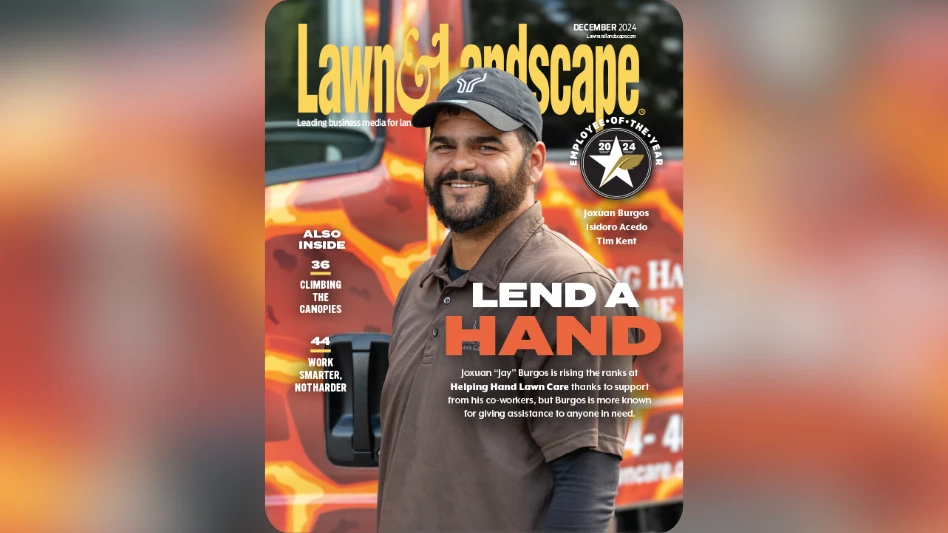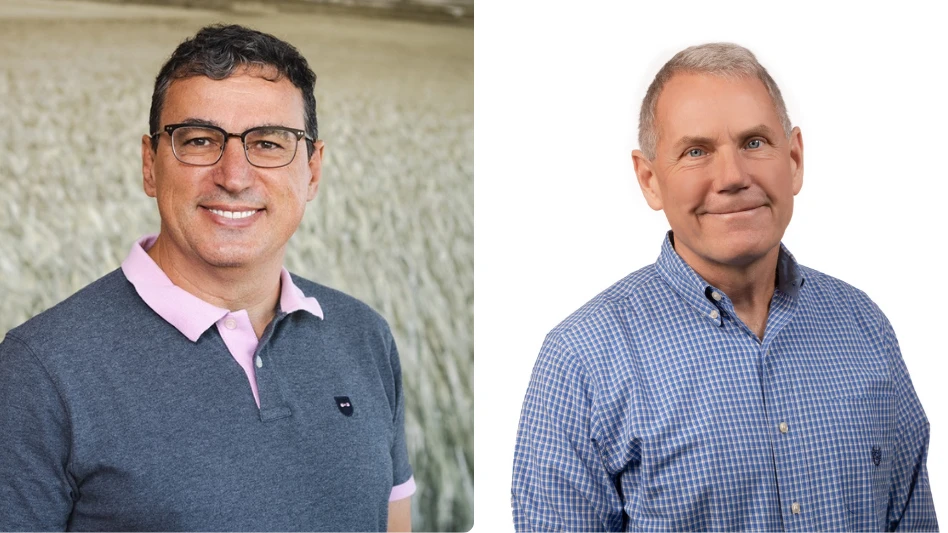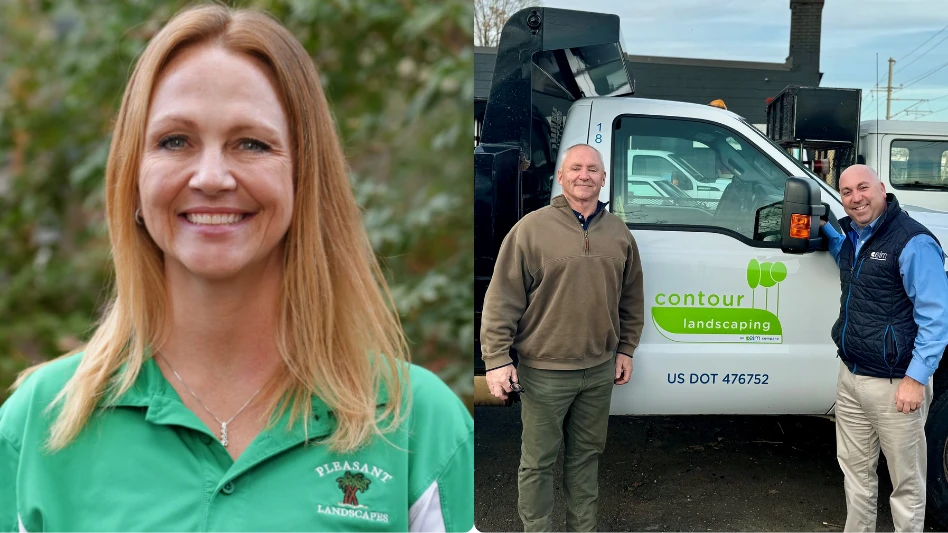Some of the best ideas any business can use come from other businesses. This year, three green industry leaders will take to the stage at the GIE+EXPO and give their perspective on one of the worst years in recent memory.
Craig Ruppert, owner of Ruppert Cos., Rick Ascolese, president and chief operating officer of TruGreen LandCare, and Scott Brickman, CEO of The Brickman Group, will lead the Green Industry Conference keynote session Oct. 29 in Louisville, Ky.
Lawn & Landscape talked with these three industry giants to get their insight on the current state of the green industry, as well as their suggestions for how to survive and thrive in today’s challenging economy.
 Scott Brickman joined The Brickman Group, Gaithersberg, Md., in 1986, serving as a project director and a regional manager, and then assuming responsibility for the company’s Northeast, Mid-Atlantic and Southeast operations. In 1998, he became a director of the company, and at the age of 35 was appointed CEO.
Scott Brickman joined The Brickman Group, Gaithersberg, Md., in 1986, serving as a project director and a regional manager, and then assuming responsibility for the company’s Northeast, Mid-Atlantic and Southeast operations. In 1998, he became a director of the company, and at the age of 35 was appointed CEO.
Through a series of strategic financial and operational decisions, Brickman and his team successfully grew the company to its current size of $680 million in annual revenue (representing a 500 percent increase in seven years), almost 10,000 employees and 160 branches serving 29 states. Most of the growth has been organic.
Brickman has been recognized for his leadership and entrepreneurial expertise, including Lawn & Landscape’s Leadership Award in 2004, and Ernst & Young’s Entrepreneur of the Year Award in 2006.
How do you feel about the current state of the green industry?
I think the industry is strong in spite of current economic conditions. Obviously, the lack of new construction hurts that end of the business, but as the economy recovers, demand for landscape services will continue to grow.
How is your business faring in today’s tough economy?
Our focus on the maintenance side of the business has served us well. It has helped us renew our focus on operational quality. We have been able to remove waste and rework from our processes while improving our customer satisfaction scores.
What is one piece of business advice you received once that you did not follow – and why are you glad you didn’t follow it?
I have been advised many times that we should expand into this or that line of business because it held great potential. I am glad we stuck to our knitting and the business we know best. Often the best decisions are saying “no.” I believe you can only do so many things well.
If you could give a small business owner in the landscape industry one piece of advice what would it be and why?
My advice would be to focus on what it is you want to be, who it is you want to serve, and what it is you are going to provide that will make them want to hire you. I think it’s real easy to try to be all things to all people and to look for the next best thing instead of staying focused on one or two things.
Who has been a mentor to you in business and why? What insight did this person provide to you?
My greatest mentor has been my father, Dick Brickman, who always focused on doing great work and taking care of and empowering people. He taught me success and profit are the outcome of doing these things.
What do you foresee for the industry in the next two to three years?
I think the industry will rebound strongly as the economy comes back, and that the stronger companies will thrive with some of the weaker players exiting. I believe the demand for sustainability and green services will continue to grow and that staffing will become a big challenge as unemployment drops and the population ages.
 Rick Ascolese is president and COO of TruGreen LandCare, based in Memphis, Tenn., where he oversees the operational and strategic direction of the company.
Rick Ascolese is president and COO of TruGreen LandCare, based in Memphis, Tenn., where he oversees the operational and strategic direction of the company.
He has a bachelor’s degree in sociology from Ohio’s Miami University and an MBA from the University of Cincinnati.
Previously, he spent 18 years with another ServiceMaster business unit, American Home Shield. There, he held several leadership positions, including his last position of executive vice president, where he oversaw sales, marketing and operations.
How do you feel about the current state of the green industry?
It’s a tough environment, but I think we’re seeing a transformation of the industry and there’s opportunity for businesses to emerge stronger and better equipped to meet their customers’ needs. It’s a very fragmented industry, but the challenges are universal. Companies are facing tremendous price pressure and being forced to re-evaluate their business models. But in light of this, they’re finding innovative ways to manage the way they deliver services, looking for new services to provide, seeking ways to maintain and strengthen their relationships with their customers – all things that will make our industry stronger in the long-term.
How is your business faring in today’s tough economy?
We’ve been working over the past two to three years to become a much more focused, efficient and innovative company. We’re a much stronger, more strategic company than we were when we started down this path – and, thankfully, better prepared to weather the current economic storm. This has been a tough year for everyone; no one could have predicted how steep the market would drop. It’s been unprecedented. But, it hasn’t deterred us from our commitment to grow our business. We’re working much smarter, more collaboratively and leaving no stone unturned.
What are your most important methods for survival in today’s economy?
Focus and perseverance. You can’t afford to be caught off-guard or be sidetracked or to be afraid to make some tough decisions. You’ve got to have a clear strategy that’s driven by a balanced focus on your associates, your customers and your shareholders. When these things are aligned, your priorities are balanced, and you can focus on those things that will drive maximum return on your investment.
What do you know now that you wish you knew five or 10 years ago to better prepare your business for recession?
As I talk with others in the landscape industry, none of us have imagined the market would be where it is today. Even so, we at TruGreen LandCare made a conscious decision several years ago to be a more strategically focused operation, to better leverage our resources, to strengthen our processes – all those things that have made us a stronger, more profitable company today, even in these difficult times. Hindsight is always 20/20, but if you’re following sound business principles, there will be less room for regret or second-guessing, no matter the situation.
What is your business philosophy?
Do the right thing. It’s one of our core values here at TruGreen LandCare, and at all the ServiceMaster family of brands. When you’re focused on doing the right thing, the circumstances may change, but a lot of the conflict and confusion are taken out of the decision-making process. When you’re committed to doing the right thing, you don’t take shortcuts and you’re consistent, no matter what the state of the economy is. That’s always good business.
What is the most challenging situation you’ve encountered in your landscape business and why?
As we grow in size and maturity as a business, it’s important that we develop a culture and a set of expectations that are consistent throughout the country. People in the landscape industry are pretty independent; they’re used to managing their relationships with their customers at the local level. And those aren’t things we want to change. But we do want to better leverage the value of working collaboratively, of sharing best practices, of standardizing processes, of working to a same set of values and a clearly aligned vision. There’s a lot of change management that comes with this, but as you build trust and credibility with your team and among each other they begin to get onboard and see the value that this brings to themselves and the business as a whole.
What’s the biggest lesson you’ve learned in business, and what makes it one you will never forget?
Very simple: Take care of your associates, and they’ll take care of your customers – and your customers will take care of your financial performance. Surround yourself with smart, honest, hard-working people who are committed to doing the best job possible each day.
If you could give a small business owner in the landscape industry one piece of advice what would it be and why?
Don’t take shortcuts. Define and stay disciplined to your processes and the way you manage your team. This makes for a solid foundation that can hold the business up during stressful, challenging times. And it makes for a foundation that can handle growth without going under. If you take shortcuts along the way it weakens your foundation, which weakens your business and your future.
Who has been a mentor to you in business and why? What insight did this person provide to you?
I’ve been fortunate to have worked with several great leaders and to have learned from them all. I’ve learned the importance of trusting yourself and looking forward, not backward. I’ve learned that to be successful, you have to give part of yourself to your team. And I’ve learned that to be a successful leader and build a strong company, you cannot be afraid of failure. You’ve got to take risks – and you’re only comfortable doing that when you trust yourself and are looking ahead.
What do you foresee for the industry in the next two to three years?
We’ll be a stronger industry in the long run. We’ll be working more efficiently, and we’ll be more focused on delivering great service and building stronger relationships with our customers. We’ll have tighter margins with less room for mistakes, so we’ll have to be at the top of our game each and every day. And on the environmental front, we’ve got an opportunity to take huge steps forward. We are the “green” industry. Our customers will be depending on us even more to not only help them navigate the myriad of environmental regulations but also to help position them as responsible and environmentally friendly through the use of landscaping.
 Craig Ruppert is president of Ruppert Cos., based in Laytonsville, Md. The firm comprises five companies: Ruppert Landscape, which performs commercial landscape installation/management at 11 branch offices in the mid-Atlantic region and employs 600; Ruppert Nurseries, a wholesale tree growing operation; Ruppert Properties, which owns, develops and manages select commercial properties on the East Coast; Ruppert Ventures, and the Ruppert Foundation. Prior to establishing Ruppert Cos., he was the founder and owner of Ruppert Landscape Co., which was sold in 1998.
Craig Ruppert is president of Ruppert Cos., based in Laytonsville, Md. The firm comprises five companies: Ruppert Landscape, which performs commercial landscape installation/management at 11 branch offices in the mid-Atlantic region and employs 600; Ruppert Nurseries, a wholesale tree growing operation; Ruppert Properties, which owns, develops and manages select commercial properties on the East Coast; Ruppert Ventures, and the Ruppert Foundation. Prior to establishing Ruppert Cos., he was the founder and owner of Ruppert Landscape Co., which was sold in 1998.
What is your background? Tell our readers more about some of your experiences in the industry.
I started mowing lawns in the neighborhood I grew up in. I am one of eight children, and if you wanted a new bike you had to earn the money to pay for it. I went to high school in Washington, D.C., and after a brief stint at the University of Maryland I was working for a construction company running their insurance restoration division and keeping the landscape company going on the side with my brother Chris, who was running it day to day. In the late 1970s, the growth of the landscape company led me to quit my day job and concentrate on landscaping full time, where I have been ever since.
What are important survival methods in today’s economy?
We have and will continue to try to grow our landscape management division over our landscape construction division, as it is less affected by recessions.
Spread the responsibility and accountability for your company’s success widely amongst the management team. Empowering a large group of your people to overcome the challenges of a tough economy seems to work best for us.
What’s the biggest lesson you’ve ever learned in business?
Your company is only as good as the people you’ve assembled and empowered to run it. And although this is a simple, clear message, to some degree every manager has to relearn it on a daily basis. Because living this philosophy can be so hard, adding structure around employee appreciation, employee recognition, company events, etc., is a fundamental tool.
If you wrote a letter today to yourself when you first started out in this business, what would it say?
Knowing the answers or the right approach is less than half the equation. Living and practicing your beliefs is the hard part. No matter how many years you’re in the business you need to expend a great deal of energy to continue to learn, trust and grow every day.
What advice would you give a small business owner today?
Your purist sustainable competitive advantage over all of your competition is your ability to learn and adapt quicker than them. Every company has their own challenges, and it’s the ability to learn and execute that creates success.
Nicole Wisniewski, Chuck Bowen and John Torsiello, a Torrington, Conn.-based freelance writer, contributed to this story. For more information, contact nwisniewski@gie.net.

Explore the October 2009 Issue
Check out more from this issue and find your next story to read.
Latest from Lawn & Landscape
- LawnPro Partners acquires Ohio's Meehan’s Lawn Service
- Landscape Workshop acquires 2 companies in Florida
- How to use ChatGPT to enhance daily operations
- NCNLA names Oskey as executive vice president
- Wise and willing
- Case provides Metallica's James Hetfield his specially designed CTL
- Lend a hand
- What you missed this week





